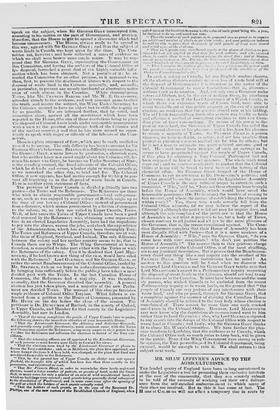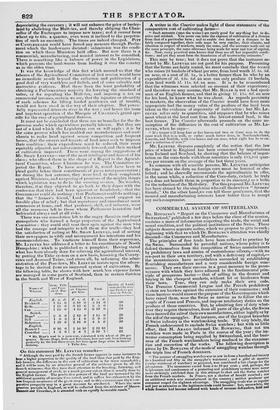MR. SHAW LEFEVRE'S ADVICE TO THE AGRICULTURISTS.
Tun landed gentry of England have been SO long accustomed to make the Legislature a tool for promoting their exclusive intel'ests at the cost of the community, that they cen scarcely submit to be told of the necessity of working out their own deliver- ance from the self-entailed embarrassment in which many of their class are involved. But to this it has come at last. The Hiuse of Cmmm ins will not effea a temporary rise in rents by depreciating the currency ; it will not enhance the price of barley- land by abolishing the Malt-tax, and thereby obliging the Chan-
cellor of the Exchequer to impose new taxes; and it cannot force
wheat up to Ges. a quarter, even were it inclined to the perpetra- tion of such an enormity. The times are indeed changed. Purr or CASTLEREAGH could have forced any measure through Parlia- ment which the landowners dictated: submission was the condi- tion on which these Ministers held office. But now there is a commercial, manufacturing, and monied interest to be consulted. There is something like a balance of power in the Legislature, which prevents the landovners from bolding it over the country as in the olden time.
It was the knowledge of this fact which assured us that the labours of the Agricultural Committee of last session would have no immediate result beyond the collection and publication of a good deal of vely worthless and foolish, and of some valuable and instructive evidence. Had there been the least probability of obtaining a Parliamentary majority for lowering the standard of value, or for repealing the Malt-tax, and imposing a tax on commercial incomes, certain we are, that the injustice or absurdity of such schemes for lifting landed gentlemen out of trouble, would not have steed in tic way of their adoption. But power- fully represented interests were in the way ; and hence the lame and impotent operation of the Malquis of Criaanuos's grand spe- cific for the cure of agricultural distress. It must not be concluded that there are no'remedies for the de- pression under which agriculture partially labeurs. But they are not of a kind u Well the Legislature can or will apply : it is by the same process which has enabled our manufacturers and mer- chants to make bead against severe competition and frequent losses, that the owners and tenants of land must seek to improve their conditioa : their expenditure must be reduced, their rents equitably adjusted. not indiscriminately Jeweled, and their method of cultivation improved. These were among the suggestions of Mr. SHAW Lvrsvux—one Or the most intelligent and honest of his class ; who offered them in the shape of a Report to the Agricul- tural Commiitee, %%hose Chairman he was. The Committee re- jected the Report. To have accepted it, would have been to plead guilty before their constituents of gross misrepresentation ; for during the last autumn, they were loud in their complaints against Ministers, and unsparing of promises of the mighty things which legislation was to do in the ensuing session. No wonder, therefore, II at they objected to go back to their dupes with the confession that they bad been ignorant or fraudulent,—that the Government could do not ; that Parliament could do nothing; that the " farmer's friend,- Lord CH ANDOS, could suggest no feasible plan of relief ; but that repentance and amendment must commence at home, and that prudence, skill, and industry, were all the resources left to those whom Parliament heretofore had befriended alwa)s and at all risks. There was one consolation left to the angry theorists and eager monopolists who formed a large proportion of the Agrieultural Committee : they could still vent their spite against the man who had the courage and integrity to tell them the truth—they had the satisfaction of railing at Mr. Straw LEFEVRE, and of setting
their newspapers to vilify and misrepresent his intentions and his
recommendations. To vindicate himself from their aspersions, Mr. Lr FEVRE has addressed a letter to his constituents of North
Hampshire ; which is published as a pamphlet. Having stated what has been already done for relieving the agricultural interest, by putting the Tithe system on a new basis, lessening the County-
rates and Assessed Taxes; and above all, by reforming the admi- nistration of the Poor-laws, Mr. LEFEVRE insists upon the advan- tage to be derived from an improved system of cultivation. By
the following table, he shows with bow much less expense farms are managed in some parts of Scotland, than in certain districts in the South and West of England.
--
Rent. Tithe Names or stud Pato-
Witness. chial Har- dens.
Brickwell Wife Scotch.
Hope* Bell Robertson English.
Bennett t
CIOW ther .•
• Mr. Slope's rent is a co wrent, calculated with wheat at 50s. per quarter. Messrs. Hope. Hell. and Robes, n, have not only been farming profitably for the last three years but hayi spent large sums in furrow- draining. * Tithe free.
On this statement Mr. LEFEVRE remarks- " Although the rent paid by the Scotch farmer appears in some instances to bear a higher proportion to the quality of the land than that paid by the Eng- , fish farmers, the difference in the cost of cultivation is far more remarkable; and it will be seen, by an attentive pet usal of the evidence given by all the Scotch witnesses, that they turn their attention to the breeding, fattening, and general management of stock, to a much greater ext....nt than is te•ually done by the English farmer. The productiie powers of the land ate increased by the additional quantity of manure this raised, and it suffers less exhaustion by the less fi:equent recurrence of the gr..in crop; and to this circumstance their coin • paratave prosperity may in a great measure be attributed. Where the same practice prevails in England, as will be collected from the evidence of Mess's. Bennett and Crowther, it is attended with an equally favourable result."
.E. S. d.
1 15 0 1 11 6 1 15 0 2 3 9 1 8 3 I 19 0 0 16 0 I 2 0
nnualAves- st:e Expetnt per Acre.
s. d.
:3 19 0 3 13 6 4 15 0 2 12 0 2 I 0 2 16 0 1 16 10 2 8 7 30 24 130 29 28 30 16 22
s. d.
5 14 0 5 5 0 6 10 0 4 15 9 3 9 3 4 5 0 2 12 10 3 10 7 --
Quality of IA10.! • stimated try a%es-' are Produce per ' Aete ill W lout.
Total.
A writer in the Courier makes light of these statements of the comparative cost of cultivating farms- !, Such accounts (says the writer) are rarely good for any thing but to de- ceive and mislead. You never can infer the expense of cultivation of a district from that of a particular farm ; and to enable two farms at a distance to be fairly compared together, their soils must be very similar, their climate, and situation in respect of markets, nearly the same, and the accounts made out on the same principle, the same allowance being made for wear and tear of capital, &c. Now, cvely practical man knows that these are all but impossible condi- tions; and yet they must form the foundation of all trustworthy estimates." This may be true; but it does not prove that the instances se- lected by Mr. LEFEVRE are not good for his purpose. Presuming that the farms are fairly rented, we must conclude that the tervent who raises 28 bushels of wheat per acre, from land worth 1/. 8s. 3d. an acre, at a cost of 2/. Is., is a better farmer than he who by an expenditure of 3/. 13s. Gd. an acre can only produce 24 bushels, from land worth 1/. 11s. 611. an acre. It is to be remembered that the witnesses were selected on account of their experience; and therefore we may assume, that Mr. ROLFE is not a bad speci- men of an English farmer, and that in giving 1/. lls. Gd. an acre for his land, he knew what he was about. As regards proximity to markets, the observation of the Courier would have been more appropriate bad the money value of the produce of the land been taken as the evidence of superiority of cultivation : but Mr. LE- FEVRE refers only to quantities, and supposes that he who raises most wheat at the least cost from the lowest-rented land, is the best farmer. The Courier afterwards proceeds on the same as- sumption of the difference in the cost of cultivation as Mr. LE- FEVRE, when he says- " If a tenant will keep four or five horses and two or three men to do the same work that is as well, or rather much better done, in Northumberland, Lincoln, and Norfolk, with two horses and one man, what right has he to ex- pect a reduction of rent?"
Mr. LEFEVRE disposes completely of the notion that the low price of wheat in England has been occasioned by importations from Ireland and Scotland, by showing that the balance of impor- tation on the corn-trade with those countries is only 193,581 quar- ters per annum on the average of the last three years.
In common with all sensible persons, Mr. LEFEVRE anticipates the time when the duty on foreign corn must be lowered or abo- lished; and he shrewdly recommends the agriculturists to offer, in the mean while, a reduction of the Corn-duty, (which he truly says does not benefit them in proportion to its amount,) as a bribe for the reduction of the Malt-duty. For this proposal Mr. LEFEVRE has been abused by the simpletons who call themselves " farmers' friends." On the other hand,we can tell those gentlemen, that the monied and manufacturing interests know better than to accept any such compromise.



























 Previous page
Previous page